Reviews 2019-20
Wed 9th Oct. 2019
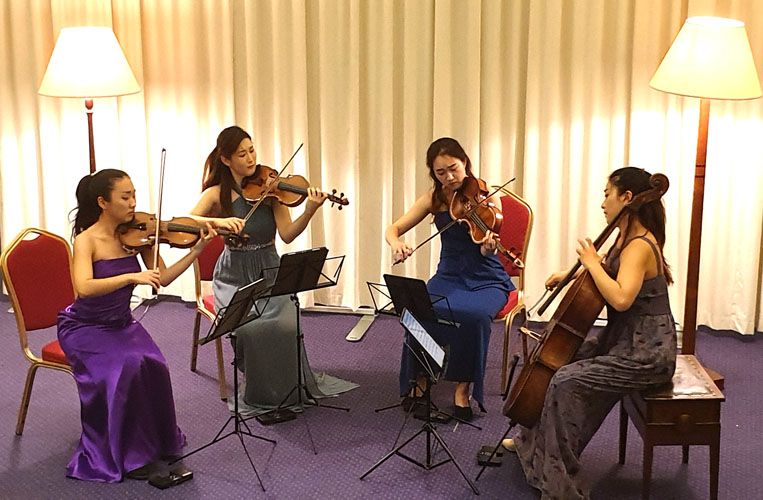
Esme Quartet
For the first concert of the 2019/20 Season, the large, appreciative, audience of 81 were treated to an outstanding performance from the Esmé String Quartet. This group of young Koreans ladies, now based in Germany, came to Kirkcaldy as part of their British tour. Individually the players are of the highest standard. Collectively they have a wonderful rapport that appears effortless. They opened the concert with Beethoven’s first Quartet, his Opus 18 No 1. Although it was one of the last of the Op 18 set to be completed, it was published as No 1. The emotional tensions of the outer movements were perfectly captured by the Quartet. This was followed by Anton Webern’s intimate and tender Langsamer Satz. Again the intense emotions were wonderfully portrayed by the Quartet. After the interval we heard Mendelssohn’s last Quartet, his Op 80. Written after the death of his beloved sister Fanny it is full of passion, sorrow and anger. Its’ elegiac Adagio expresses his sadness. After prolonged applause the Esmé played an encore of a Korean Folk Song, beautifully arranged for String Quartet. Its slightly melancholy air wonderfully complemented the Webern and the Adagio of the Mendelssohn. The Esmé String Quartet are currently studying for a Master of Chamber Music in Germany and are assuredly a name to remember for the future. We wish them well.t
.
For more information please look at the Programme page here
Wed 6th Nov. 2019
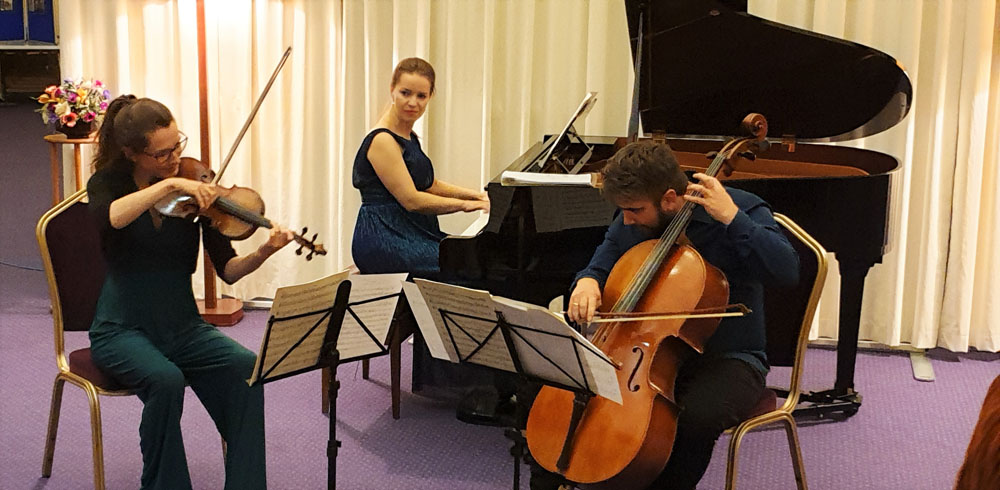
Kapten Trio
After almost exactly three years the Kapten Piano Trio made a welcome return to KMS. The group performed a very Mozartian sounding Mozart Trio K548 and similarly, an unmistakably Brahmsian sounding Brahms Op 87 Trio. These contrasted with Debussy’s early Piano Trio, distinctly unlike his later works, but full of youthful passion. This work is well worth getting to know. The group’s Residency with Enterprise Music Scotland between 2017 and 2019 gave them the opportunity to commission new music by Scottish based composers. This resulted in two pieces portraying different aspects of the Ocean. Canadian born composer Emily Doolittle studies zoomusicology which is the study of relationship between human music and animal songs. The plaintive and often repetitive vocalisation of Bowhead Whales were depicted in her piece “Bowheads”, in four short movements. The other piece, “Colour of Drifters” by Japanese born Shiori Usui concerned the pollution of our Oceans. This was a very visual work with plastic bottles. a fishing net and a nappy strewn about the floor. The violinist moved about, the pianist stood and hit the piano strings, and the cellist had the nappy tied round the finger board at one point. The plaintive music depicted the suffering sea pollution causes to marine creatures. The musicians all became entangled in the net and they vocalised gasping and panting which depicted air breathing sea creatures struggling as they were unable to surface for air. Two truly memorable, thought provoking pieces. The review in 2016 considered the group’s uncertain future due to the many other commitments of the individuals. We are delighted our fears were groundless and that the group are still together and better than ever.
.
For more information please look at the Programme page here
Wed 4th Dec. 2019
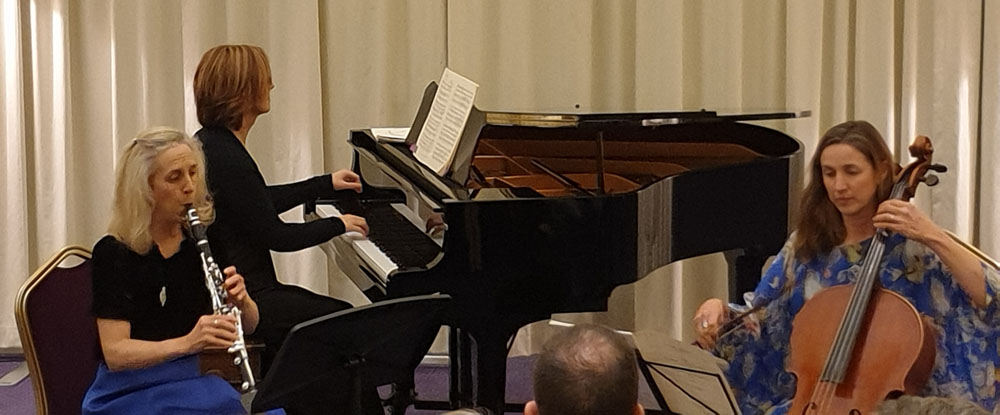
Trio Ecossaise
Trio Ecossaise came together fifteen years ago and through this lengthy association have developed an intimacy in their performance which reaches out to embrace the audience. They are equally at home in the classical repertoire of Brahms and Beethoven but chose for their Kirkcaldy recital pieces composed by women—bringing together Louise Farrenc and Clara Schuman from the 19th century with the contemporary American, Gwyneth Walker, in a finely balanced programme.
Louise Farrenc's Trio in E flat Major showcased the strengths of this talented trio. In the first movement the melody introduced by Jennifer Brown on clarinet led into a musical dialogue with Harriet Davidson's cello, underpinned by the colourful piano of Claire Haslin—a delicate interplay which gave space for each of the instrumentalists to pick up the theme. This fine balance of intimate ensemble playing interwoven with passages of individual brilliance continued into the subsequent movements and indeed characterised the Trio's performance throughout the whole evening. The significant role of the clarinet in the final two movements was enhanced by the fine acoustics of the Old Kirk.
Gwyneth Walker's “Craftsbury Trio” is an affectionate celebration of rural life. The titles of the individual movements convey the different moods: “Up-Country Toccata”, “The Lark in the Morning”, “You Can Buy it at the General Store” and “Craftsbury Common”. It draws on a rich variety of musical effects to capture the qualities the composer evokes—as well as offering the players scope for improvisation from time to time. “The Lark in the Morning” has a folksong aspect, while in “You Can Buy it at the General Store”, one of the variety of musical wares on offer is more than a hint of Gerschwin. From the verve of the “Toccata” to the haunting conclusion of the elegiac final movement the sensitive mutual understanding and individual versatility of the players were vividly clear.
As a composer, Clara Schuman has belatedly emerged from the shadow of her husband Robert—who in fact owed so much to her, in life support and in the establishment of his musical reputation. In her Piano Trio in G minor, Trio Ecossaise revealed qualities much richer than simply the “charm” for which it has been faintly praised by some (predominantly male?) critics. There is dynamism as well as grace in the minuet tempo of the Scherzo, while after the more reflective tone of the Andante there is real energy in the final Allegretto.
The engaging and informative introductions to the pieces, by each of the performers in turn, enhanced the pleasure of the Trio's performance of a thoroughly interesting, well balanced programme. There was a fine balance, too, in the interplay of the gifted individuals who make up the Trio Ecossaise, who throughout the evening rose superbly to the challenges of a startling variety of musical styles and effects.
For more information please look at the Programme page here
Wed 15th Jan. 2020
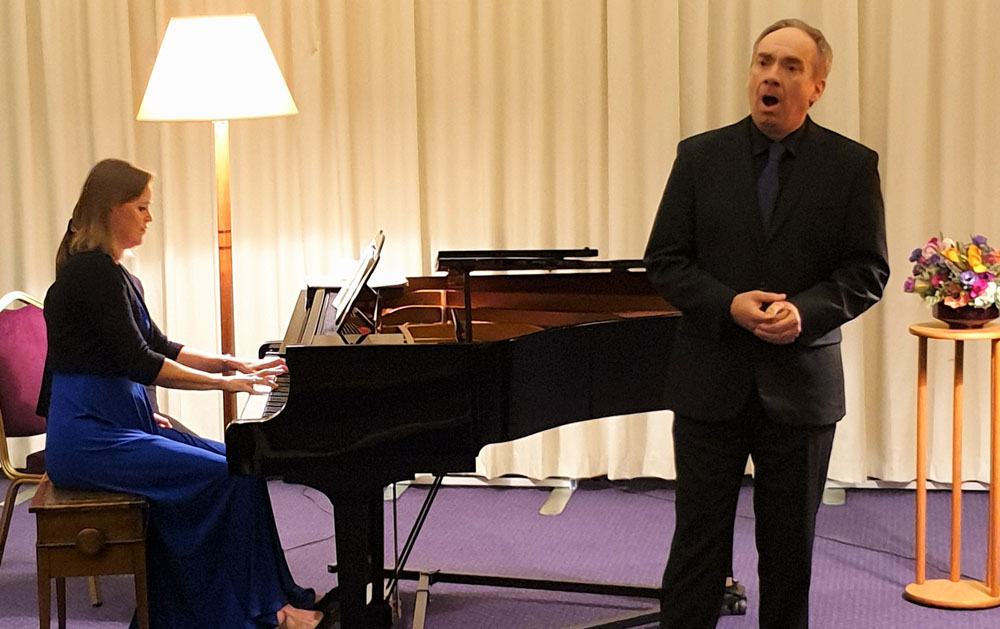
James Gilchrist/Anna Tilbrook
An enthusiastic audience of 80 braved the fearful windy evening to attend this month's recital given by James Gilchrist and Anna Tilbrook. These two marvellous artists had charmed the Society three years ago, so no one wanted to miss this special recital of wonderful British and German songs.
The programme began with the emotive song cycle by George Butterworth which has become associated with the First World War as Butterworth himself died at the Somme. Anna's sensitive playing and James's intensely expressive singing produced a few tears in the audience especially in the last song when the ghost of a dead friend asks "Is my team ploughing" and "Is my girl happy now I am thin and pine" and most desperately of all " have you found to lie in a better bed than mine" when the singer has to reply "I cheer a dead man's sweetheart, never ask me whose."
The intensity of the atmosphere was relieved by James Gilchrist's illuminating explanation of Robert Louis Stevenson's poems of Songs of Travel set by Ralph Vaughan Williams. The cycle relates the progress of a young man setting out on life and his relationship with nature and the challenges of life. These songs are on a larger canvas than the Butterworth ones and displayed some glittering playing by Anna to support James's warmer tone and, as ever, expressive singing.
After the interval we were treated to four of Schubert's famous songs. "The Trout" which was delivered with some humour and "The Fisher" where James told the story of the fisher being charmed by a mermaid and following her under the water never to be seen again. These songs led on to the jaunty story of Ganymede and the absolutely beautiful Du bist die Ruh performed by our two superb artists.
The meat of the programme was of course Schumann's song cycle Dichterliebe "A Poet's Love". As wonderful as all the rest of the programme was the best was still to come. Schumann's cycle is absolutely superb relating the progress of a love affair which starts so magically in the wonderfully beautiful month of May but soon collapses in desperation and overpowering grief. Gilchrist and Tilbrook perform this work with intense sensitivity and expressiveness with supreme attention to all the nuances, delights and desperation in Schumann's score. I became aware of the incredible silence and concentration in the audience as Heine's poems and Schumann's music unfolded.
Gilchrist has a wonderful ability to sing incredibly softly and to express the huge wonder of the poet's delight and also the desperation of the lowest moods of despair. The cycle closes with the piano playing the most beautiful postlude as the singer remembers the delights of the love and Anna performed this as beautifully as I have ever heard it.
For more information please look at the Programme page here
Wed 19th Feb. 2020
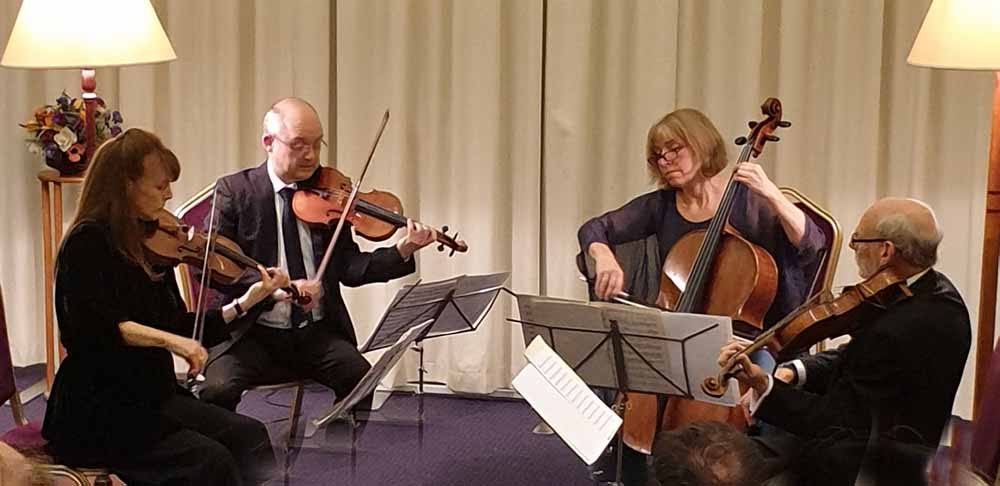
Fitzwilliam Quartet
Despite the wintry weather, a large audience welcomed The Fitzwilliam String Quartet. They are one of the longest established Quartets in the world, having been formed in 1968 by four Cambridge undergraduates. The concert started with the Earl of Kellie's Quartet in C minor. Born in the same year as Haydn, sadly much of his music has been lost. What we heard was of the highest standard; it's amazing to think such high quality music was being produced in Fife, and the players of the time must have been very accomplished. There were many stormy passages in this work and this was also apparent in the following piece, Hugo Wolf's Italian Serenade. An Italian serenade should be calm, serene music, but there are dark moments in this beautiful work, perhaps due to Wolf's precarious nervous health. The Quartet's personal friendship with Shostakovich allowed him to entrust the Quartet with the Western premières of his last three quartets. This association was apparent in their faultless performance of his Quartet No. 12. After the interval we heard Schubert's “Rosamunde” Quartet. After the slightly dark opening, the work is just one glorious song tune after another, with the Andante featuring incidental music from Rosamunde. Overall this was a wonderful performance from the Fitzwilliam with tight communication between the players. Special mention should go to Andrew Roberts who was an able guest with the Quartet on second violin.
For more information please look at the Programme page here
Wed 18th Mar. 2020

Maharaj/Degavino Duo
This concert was cancelled due to the Covid lockdown which also cancelled the entire 2019-20 series. It is hoped that the duo will play for us in late 2021.
For more information please look at the Programme page here
AGM April
AGM
